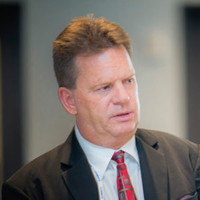
Alan Knapp
Senior Director
Evoqua Water Technologies
Collaborators
Tags
UPWThe Importance of High Purity Water in Microelectronics
Share this insight
High purity water is critical to microelectronics manufacturing, from microchips to light-emitting diodes (LEDs), silicon wafers and specialty chemicals. The consequences of water impurity are significant in the manufacturing process defectivity. Proactively maintaining your water purification system is just as important as selecting and installing the right system in the first place to enhance yield.
Water quality standards typically follow ASTM E-1.1, E-1.2 and SEMI C63 specification requirements with an emphasis on Total Organic Carbon (TOC), silica, metals (including boron) and particles, in addition to specific customer requirements. The manufacturer is ultimately responsible for establishing the specific water quality standards they need to ensure the water meets industry guidelines. As a result, manufacturers often look to experienced water treatment technology providers to understand water standards and assist with system design, installation and ongoing service to maintain water quality and reliability. Ultrapure water (UPW) systems are complicated and require a sophisticated knowledge base encompassing mechanics, assembly, physics, chemistry and more. They are usually made up of three major subsystems to achieve the required water quality: Makeup, Primary and Polish.
Makeup systems provide pre-treatment and are designed to remove most contaminants from a municipal water supply. A rate of over 99% removal of anions, metals, silica, total organic carbon (TOC) and particles is achieved using media filtration, carbon filter or chemical feed, advanced oxidation (AOP), water softening and/or antiscalant and reverse osmosis.
Primary systems focus on the removal of trace amounts of contaminants in order to lessen the load on the polishing system. TOC destruct UV, electrodeionization (EDI) or ion exchange (IX) and sub-micron cartridge filters (CF) are typical unit operations. These systems are designed to run continuously and feed the polish loop based on consumption of water in the facility.
The final part of the treatment system, polish, focuses on maintaining the required UPW quality and removing any last traces of contaminants. TOC destruct UV, polish ion exchange, critical sub-micron filtration cartridge filters (CF) and/or ultrafiltration modules (UF) are necessary to meet particle removal. This system runs continuously, at a higher flow rate than the primary system, to maintain velocity to the piping distribution loop and laterals that provide water to all factory points of use.
Ensure your high purity water supply consistently meets quality standards by partnering with an industry expert that provides the complete package: understands how to meet water purity standards, knows how to design and build an effective water treatment system and can provide timely, reliable service, operations including maintenance and repairs.
Share this insight
Related insights
5 key UPMU workshop takeaways: UPW system design principles

Georgia Bottomley
Global Water Intelligence
News-in-brief: June 2023

Orla McCoy
Global Water Intelligence
Five things we learned about UPW-energy relationship at UPM 2022

Orla McCoy
Global Water Intelligence